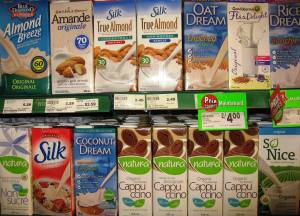
Weill Cornell’s Dr. Andrew Dannenberg is concerned about us postmenopausal women.
Postmenopausal?
Normal BMI?
Too much friggin’ trunk fat? Continue reading


Weill Cornell’s Dr. Andrew Dannenberg is concerned about us postmenopausal women.
Postmenopausal?
Normal BMI?
Too much friggin’ trunk fat? Continue reading

Just a little weight loss can go a long way in improving metabolic health, says Harvard’s Dr. Ed Giovannucci.
The evidence is clear, says the American Institute of Cancer Research (AICR), the team of scientists who’ve been studying nutrition’s role in cancer for more than three decades.
Excess body fat, particularly the kind that accumulates around the belly, increases the risk of at least a dozen cancers —pancreatic, colorectal, advanced prostate and breast cancer in us older women. If you already have cancer, it can worsen the prognosis.
So what can you do about it? Continue reading
 Is it my imagination or has Pillsbury’s Dough Boy shed a bit of belly fat?
Is it my imagination or has Pillsbury’s Dough Boy shed a bit of belly fat?
Wonder what he’s been eating for lupper? Continue reading

2018 update: For an update on Dr. Thomas Seyfried’s suggestions for treating cancer as a metabolic disease, read his article here or my piece summarizing that article.
Talk with your oncologist about using this approach and ask your oncologist to reach out to Dr. Seyfried at thomas.seyfried@bc.edu.
This week’s New York Times magazine features a story on a theme familiar to all of you readers of this anti-cancer blog : the metabolic approach to starving, or feeding, disease. It singles out insulin and a related hormone, Insulin Growth Factor-1, which we’ve talked about often. And if glucose, glutamine and certain fatty acids drive cancer growth, as the metabolic scientists quoted in the article suggest, then what could be more important than phytonutrients that keep cancer cells from utilizing those fuels? That’s another theme we’ve been addressing. Remember singing the praises of dill? Continue reading
 Ready for some anti-cancer nonsense? This weekend, the Quebec Breast Cancer Foundation is sponsoring– get this– the Montreal Cake Show! Last time I checked the anti-cancer diet books, cake was definitely off the menu.
Ready for some anti-cancer nonsense? This weekend, the Quebec Breast Cancer Foundation is sponsoring– get this– the Montreal Cake Show! Last time I checked the anti-cancer diet books, cake was definitely off the menu.
In fact, the esteemed World Cancer Research Fund/ American Institute of Cancer Research panel of scientists just issued this proclamation: Continue reading
Dr. Oz’s raw beet juice may lower your blood pressure, but the recipes he’s flagging have no place in your anti-cancer kitchen.
For example? Continue reading
Want to sneak a few satisfying starches into your anti-cancer diet– say some hot, mushy sweet potatoes ?
Here’s how:
 Can you name 10 foods that help lower your blood sugar and thus belong in your anti-cancer diet? Continue reading
Can you name 10 foods that help lower your blood sugar and thus belong in your anti-cancer diet? Continue reading
Update: Ketogenic diets may not offer the solution that scientists hoped for, but looking at how cancer cells burn fuel for energy is for sure generating insight into how cancer grows and spread. Since this article was published, some scientists have found that cancers can switch to feeding on ketones, which are generated by fat. They’ve also added some fatty acids to the list of nutrients that cancer cells may feed on. Palmitic acid, which is in coconut, may feed cancer, especially in people with certain genetic profiles. The good news is that scientists have also identified phytonutrients that keep cancer cells from using fatty acids as fuels. Among them, luteolin–present in radicchio, thyme, sage, parsley, celery flakes and seeds–is key.
Is the war on cancer now witnessing its own D-Day, a turning point in the anti-cancer fight that will change the world for good?
With the recent settlement of a major lawsuit among scientists over who owns the rights to new revolutionary approaches to managing cancer, all the experts in the field are presumably now free to talk openly—and what they’re talking about is a radical new view of the disease.
 Now that you’re eliminating mammary secretions on your anti-cancer diet, how do you decide which alternative to buy? It took a spreadsheet to figure out the answer. Continue reading
Now that you’re eliminating mammary secretions on your anti-cancer diet, how do you decide which alternative to buy? It took a spreadsheet to figure out the answer. Continue reading
 Yearning to know the best ways of preserving garlic’s anti-cancer properties? Continue reading
Yearning to know the best ways of preserving garlic’s anti-cancer properties? Continue reading
 Hey, guys. It might be a bit difficult at first to wrap your new anti-cancer brain around this one, but you’ll get used to it: Continue reading
Hey, guys. It might be a bit difficult at first to wrap your new anti-cancer brain around this one, but you’ll get used to it: Continue reading
Resolved to cut carbs? Good idea. Carbs are linked to high blood sugar, which in turn is linked to diabetes, heart disease, fat and even cancer.
Here are some creative substitutes:
For a brief update on alcohol’s link to breast cancer, click here.
The proof keeps getting stronger and stronger: Alcohol increases your risk of getting cancer, especially certain common kinds. Continue reading